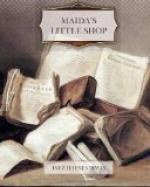“And you’re losing your limp,” Mr. Westabrook said. Then catching sight of her woe-begone face, he laughed. “That’s because you’ve stopped smiling, you little goose,” he said. “Grin and you’ll see them.”
Obedient, Maida grinned so hard that it hurt. But the grin softened to a smile of perfect happiness. For, sure enough, pricking through the round of her soft, pink cheeks, were a pair of tiny hollows.
CHAPTER XI: HALLOWEEN
Halloween fell on Saturday that year. That made Friday a very busy time for Maida and the other members of the W.M.N.T. In the afternoon, they all worked like beavers making jack-o’-lanterns of the dozen pumpkins that Granny had ordered. Maida and Rosie and Dicky hollowed and scraped them. Arthur did all the hard work—the cutting out of the features, the putting-in of candle-holders. These pumpkin lanterns were for decoration. But Maida had ordered many paper jack-o’-lanterns for sale. The W.M.N.T.’s spent the evening rearranging the shop. Maida went to bed so tired that she could hardly drag one foot after the other. Granny had to undress her.
But when the school-children came flocking in the next morning, she felt more than repaid for her work. The shop resounded with the “Oh mys,” and “Oh looks,” of their surprise and delight.
Indeed, the room seemed full of twinkling yellow faces. Lines of them grinned in the doorway. Rows of them smirked from the shelves. A frieze, close-set as peas in a pod, grimaced from the molding. The jolly-looking pumpkin jacks, that Arthur had made, were piled in a pyramid in the window. The biggest of them all—“he looks just like the man in the moon,” Rosie said—smiled benignantly at the passers-by from the top of the heap. Standing about everywhere among the lanterns were groups of little paper brownies, their tiny heads turned upwards as if, in the greatest astonishment, they were examining these monster beings.
The jack-o’-lanterns sold like hot cakes. As for the brownies, “Granny, you’d think they were marching off the shelves!” Maida said. By dark, she was diving breathlessly into her surplus stock. At the first touch of twilight, she lighted every lantern left in the place. Five minutes afterwards, a crowd of children had gathered to gaze at the flaming faces in the window. Even the grown-ups stopped to admire the effect.
More customers came and more—a great many children whom Maida had never seen before. By six o’clock, she had sold out her entire stock. When she sat down to dinner that night, she was a very happy little girl.
“This is the best day I’ve had since I opened the shop,” she said contentedly. She was not tired, though. “I feel just like going to a party to-night. Granny, can I wear my prettiest Roman sash?”
“You can wear annyt’ing you want, my lamb,” Granny said, “for ’tis the good, busy little choild you’ve been this day.”




